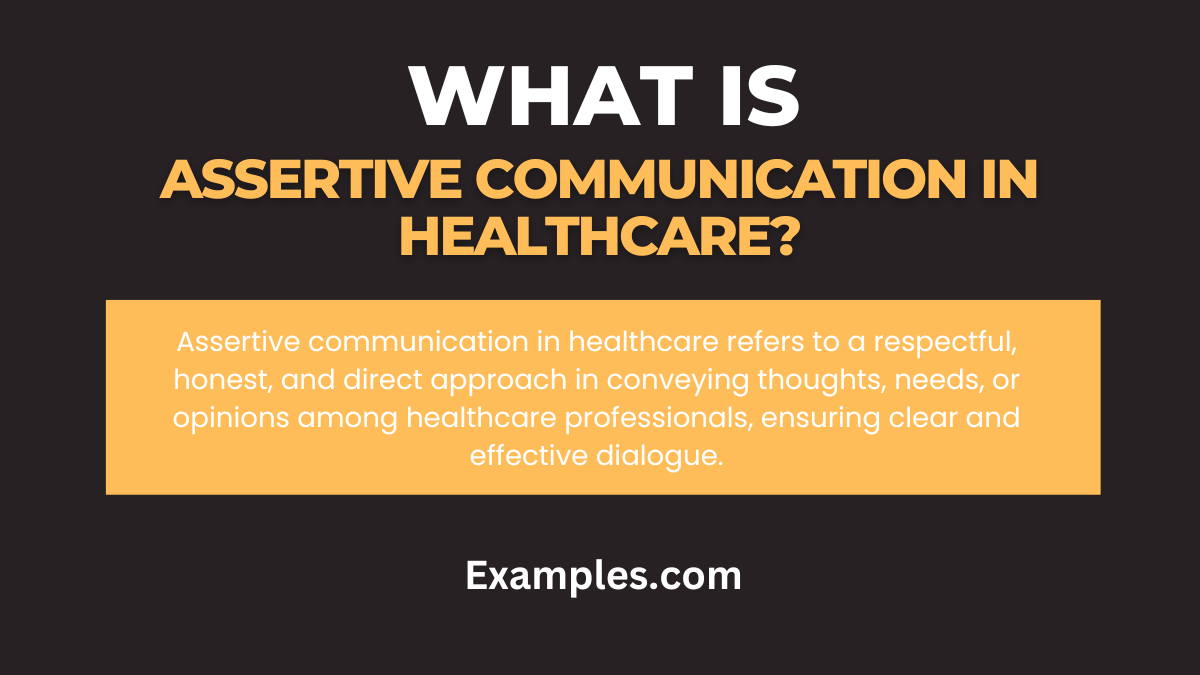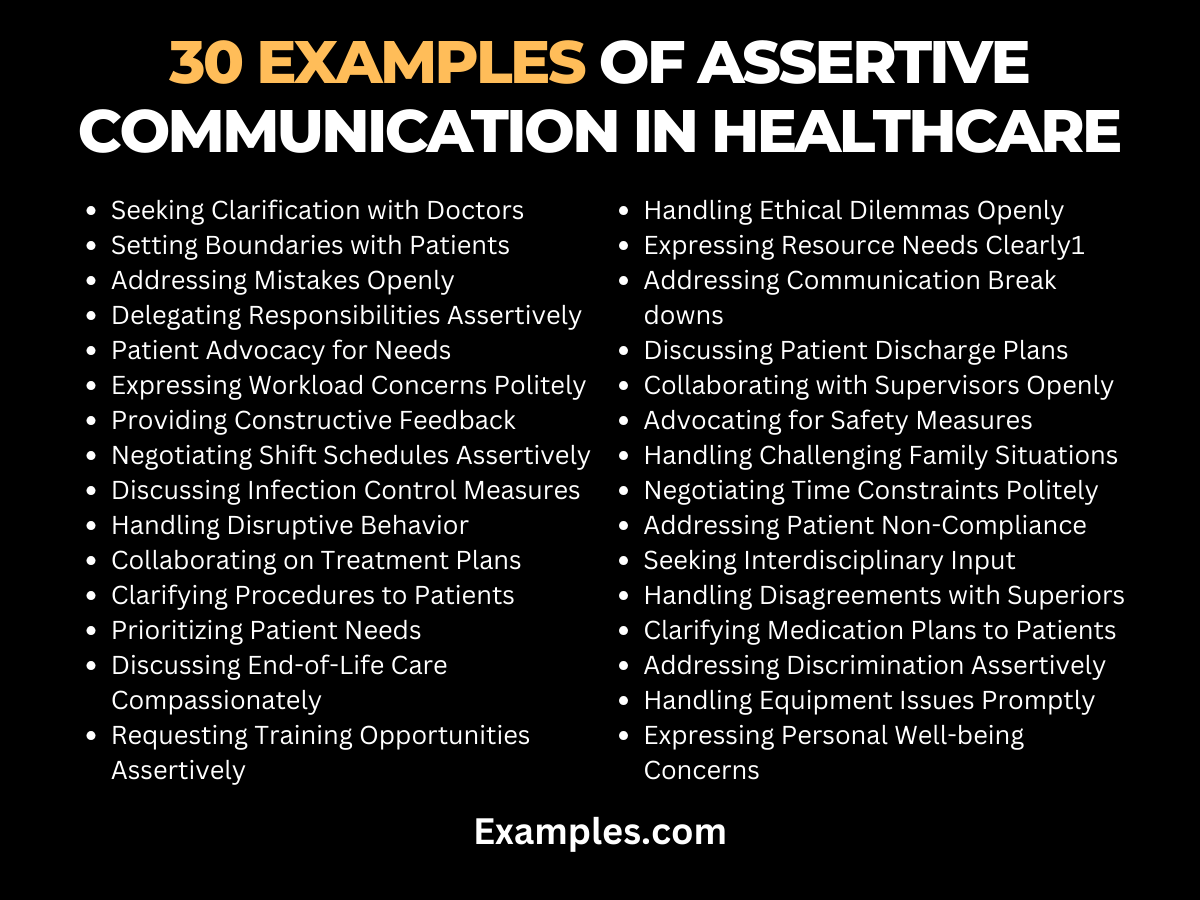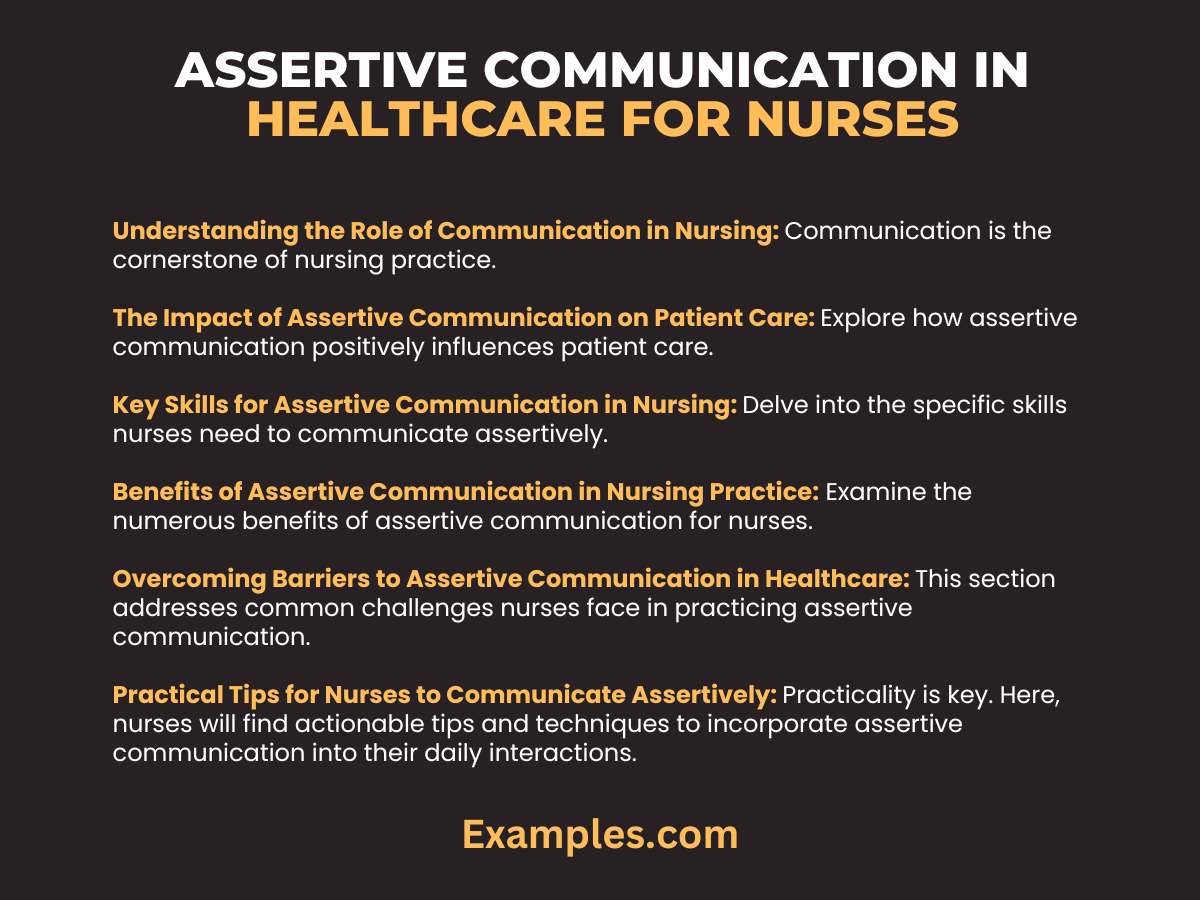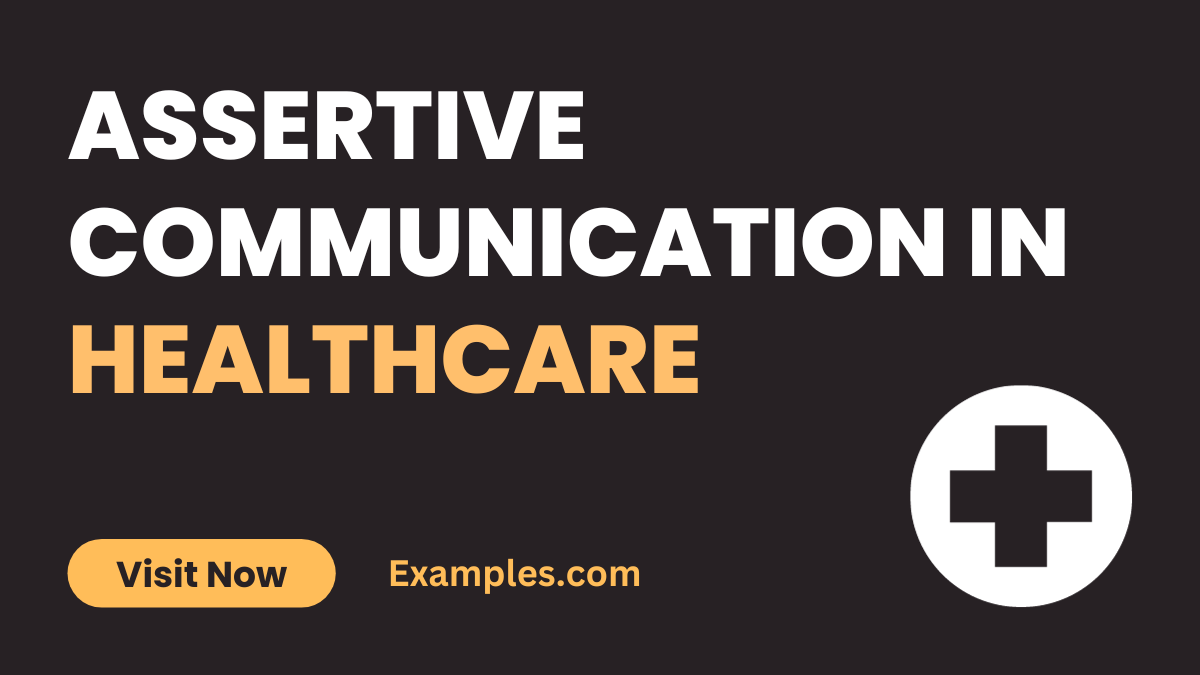29+ Assertive Communication in Healthcare Examples
Communication, the cornerstone of human interaction, transcends language and culture. From its origins rooted in ancient civilizations to its modern significance, this essential skill defines our relationships and society. Explore its definition, historical significance, diverse examples, and insightful tips, unraveling the nuances of effective communication. Uncover the secrets to clearer expression, active listening, and fostering understanding, mastering the art that connects and empowers us in every facet of life.
What is Assertive Communication in Healthcare?

Assertive communication in healthcare refers to a respectful, honest, and direct approach in conveying thoughts, needs, or opinions among healthcare professionals, ensuring clear and effective dialogue. It emphasizes maintaining a balance between expressing oneself confidently and respecting others’ perspectives.
30 Examples of Assertive Communication in Healthcare

Assertive communication in healthcare is crucial for effective collaboration. Boldly expressing concerns and ensuring clarity in instructions contribute to better patient care. For instance, a nurse can use assertive communication by clearly stating medication dosage concerns, ensuring patient safety.
- Seeking Clarification: Politely asking a doctor for clarification on a treatment plan promotes a shared understanding.
- Setting Boundaries with Patients: Clearly defining professional boundaries helps maintain a respectful environment.
- Addressing Mistakes: Acknowledging errors openly and proposing solutions showcases accountability and commitment to improvement.
- Delegating Responsibilities: Assertively assigning tasks to the appropriate personnel ensures efficient workflow.
- Patient Advocacy: Advocating for patient needs, such as requesting pain management adjustments, demonstrates commitment to their well-being.
- Expressing Workload Concerns: Politely discussing workload concerns with colleagues promotes a supportive work environment.
- Providing Constructive Feedback: Offering constructive feedback to peers fosters continuous improvement and skill development.
- Negotiating Shift Schedules: Assertively negotiating fair shift schedules contributes to a healthy work-life balance.
- Discussing Infection Control: Clearly communicating infection control measures helps maintain a safe healthcare environment.
- Handling Disruptive Behavior: Assertively addressing disruptive behavior ensures a harmonious and focused work environment.
- Collaborating on Treatment Plans: Engaging in open discussions with interdisciplinary teams enhances collaborative patient care.
- Clarifying Procedures to Patients: Using clear language to explain medical procedures helps alleviate patient anxiety.
- Prioritizing Patient Needs: Assertively prioritizing patient needs ensures timely and effective care delivery.
- Discussing End-of-Life Care: Engaging in compassionate conversations about end-of-life care preferences with families requires assertiveness.
- Requesting Training Opportunities: Assertively seeking opportunities for professional development contributes to skill enhancement.
- Handling Ethical Dilemmas: Assertively discussing ethical concerns with the healthcare team ensures patient-centered decision-making.
- Expressing Resource Needs: Clearly communicating the need for additional resources ensures optimal patient care.
- Addressing Communication Breakdowns: Assertively addressing communication breakdowns within the team prevents errors.
- Discussing Patient Discharge Plans: Clearly communicating discharge plans to patients promotes understanding and compliance.
- Collaborating with Supervisors: Engaging in open communication with supervisors about concerns enhances workplace efficiency.
- Advocating for Safety Measures: Assertively advocating for safety measures helps prevent accidents and injuries in healthcare settings.
- Handling Challenging Family Situations: Assertively addressing challenging family situations ensures a supportive and respectful environment.
- Negotiating Time Constraints: Politely negotiating time constraints in emergency situations ensures effective decision-making.
- Addressing Patient Non-Compliance: Assertively discussing non-compliance issues with patients promotes shared responsibility for health.
- Seeking Interdisciplinary Input: Engaging other healthcare disciplines for input ensures comprehensive patient care.
- Handling Disagreements with Superiors: Assertively addressing disagreements with superiors contributes to a transparent and collaborative workplace.
- Clarifying Medication Plans: Clearly communicating medication plans to patients prevents misunderstandings and errors.
- Addressing Discrimination: Assertively addressing discrimination in healthcare settings promotes inclusivity and equality.
- Handling Equipment Issues: Promptly reporting and addressing equipment issues ensures patient safety.
- Expressing Personal Well-being Concerns: Assertively discussing personal well-being concerns with colleagues fosters a supportive work culture.
Assertive Communication in Healthcare for Nurses

Effective communication is crucial in healthcare, especially for nurses who play a pivotal role in patient care. Assertive communication empowers nurses to express their thoughts, concerns, and observations clearly and confidently. This guide explores the importance of assertive communication for nurses, provides essential skills, and offers practical tips for integrating assertiveness into daily healthcare interactions.
- Understanding the Role of Communication in Nursing: Communication is the cornerstone of nursing practice. This section delves into the significance of effective communication in building patient relationships, promoting teamwork, and ensuring optimal healthcare outcomes.
- The Impact of Assertive Communication on Patient Care: Explore how assertive communication positively influences patient care. From enhancing patient satisfaction to preventing medical errors, learn how assertiveness contributes to a safer and more patient-centered healthcare environment.
- Key Skills for Assertive Communication in Nursing: Delve into the specific skills nurses need to communicate assertively. This includes active listening, clear expression, empathy, and other essential components that empower nurses to navigate complex healthcare scenarios confidently.
- Benefits of Assertive Communication in Nursing Practice: Examine the numerous benefits of assertive communication for nurses. From improved job satisfaction to enhanced teamwork, discover how cultivating assertiveness positively impacts both individual nursing professionals and the broader healthcare team.
- Overcoming Barriers to Assertive Communication in Healthcare: This section addresses common challenges nurses face in practicing assertive communication. Explore strategies and practical tips for overcoming barriers such as hierarchical structures, time constraints, and fear of conflict.
- Practical Tips for Nurses to Communicate Assertively: Practicality is key. Here, nurses will find actionable tips and techniques to incorporate assertive communication into their daily interactions. From patient consultations to team discussions, these tips enhance communication effectiveness.
Tips for Assertive Communication in Healthcare
Assertive communication is a crucial skill in healthcare, enhancing collaboration, patient care, and overall workplace dynamics. Here’s a comprehensive guide on tips for cultivating assertive communication in the healthcare setting:
- Active Listening Skills: Prioritize attentive and empathetic listening to understand colleagues, patients, and their concerns fully.
- I Statements for Clarity: Use “I” statements to express thoughts and feelings clearly, avoiding blame and fostering open dialogue.
- Respectful Tone and Body Language: Maintain a respectful tone and positive body language to create an environment of mutual respect and understanding.
- Embrace Empathy in Interactions: Cultivate empathy by putting yourself in others’ shoes, especially when dealing with patients and their families.
- Constructive Feedback Exchange: Establish a culture of constructive feedback, focusing on behaviors rather than individuals, for continuous improvement.
- Setting Boundaries Professionally: Clearly define professional boundaries to ensure a balance between compassionate care and maintaining professional integrity.
- Conflict Resolution Strategies: Develop effective conflict resolution strategies that emphasize collaboration and finding mutually beneficial solutions.
- Positive Affirmation and Encouragement: Offer positive affirmation to colleagues, recognizing their contributions and fostering a positive work environment.
- Flexibility and Adaptability: Cultivate adaptability to adjust communication styles based on the healthcare context and the needs of various stakeholders.
- Effective Collaboration Techniques: Hone collaboration skills by actively participating in interdisciplinary teams, ensuring holistic patient care.
Assertive Communication in Healthcare at Hospitals
Effective communication skills play a pivotal role in the healthcare sector, especially within hospital settings where collaboration and patient care are paramount. Here’s a comprehensive guide on how assertive communication contributes to a positive and efficient healthcare environment.
- Understanding Assertive Communication in Healthcare
- Define assertive communication and its significance in the healthcare context.
- Emphasize the balance between expressing oneself and respecting others.
- Importance of Assertive Communication in Hospitals
- Explore the impact of assertive communication on patient outcomes.
- Discuss how it fosters a collaborative and supportive hospital culture.
- Characteristics of Assertive Communication in Healthcare
- Highlight key characteristics such as clarity, empathy, and open expression.
- Provide examples of how these traits benefit healthcare professionals.
- Benefits of Assertive Communication for Healthcare Professionals
- Examine the positive outcomes, including improved teamwork and reduced errors.
- Showcase how it enhances job satisfaction and reduces workplace stress.
- Enhancing Patient Care through Assertive Communication
- Illustrate how assertive communication positively influences patient-provider interactions.
- Provide real-world examples of improved patient satisfaction.
- Assertive Communication Styles in Healthcare
- Explore different assertive communication styles suitable for healthcare professionals.
- Discuss tailoring communication based on diverse healthcare scenarios.
- Overcoming Barriers to Assertive Communication in Hospitals
- Identify common obstacles faced by healthcare professionals.
- Offer strategies to overcome these barriers and promote assertiveness.
- Training Programs for Developing Assertive Communication Skills
- Highlight the importance of ongoing training in healthcare settings.
- Provide information on available programs and resources for skill development.
- Assertive Communication Techniques for Healthcare Professionals
- Offer practical techniques for expressing needs and opinions assertively.
- Include role-playing scenarios to reinforce effective communication strategies.
- Implementing Assertive Communication in Healthcare Teams
- Discuss strategies for integrating assertive communication into team dynamics.
- Provide examples of successful implementation and its impact.
What is Assertive Communication in Healthcare?
Effective communication is paramount in healthcare, and assertive communication stands out as a crucial skill. Here’s why assertive communication is indispensable in healthcare settings:
- Patient Advocacy: Assertive communication empowers healthcare professionals to advocate for their patients, ensuring their needs are met and rights are respected.
- Team Collaboration: In interdisciplinary healthcare teams, assertive communication fosters collaboration, enhancing the coordination of patient care.
- Preventing Medical Errors: Clear and assertive communication among healthcare professionals helps prevent misunderstandings and reduces the risk of medical errors.
- Enhanced Patient Safety: Assertiveness contributes to a culture of safety, where healthcare workers can confidently communicate concerns about patient safety.
- Efficient Workflow: Assertive communication streamlines communication channels, leading to more efficient workflows and timely delivery of patient care.
- Conflict Resolution: Healthcare settings may encounter conflicts. Assertive communication equips professionals to address conflicts constructively, preserving a positive work environment.
- Improved Patient Outcomes: The clarity and confidence in assertive communication directly impact patient understanding, compliance, and, ultimately, positive health outcomes.
- Staff Well-being: By expressing needs, concerns, and workload issues assertively, healthcare professionals contribute to a supportive work culture, enhancing overall staff well-being.
- Informed Decision-Making: Assertive communication ensures that all stakeholders, including patients and colleagues, are well-informed, facilitating better decision-making.
- Patient-Centered Care: Assertive healthcare professionals actively involve patients in decision-making processes, fostering patient-centered care approaches.
How Can Healthcare Assertive Communication Improve Patient Outcomes?
Effective communication in healthcare is pivotal in achieving positive patient outcomes. Assertive communication, characterized by clarity, respect, and empathy, significantly impacts patient care and satisfaction. Here are ways it enhances outcomes:
Enhancing Care Coordination: Assertive communication among healthcare teams ensures seamless coordination, reducing errors, and improving treatment plans.
Patient Engagement and Compliance: Clear, assertive communication empowers patients, enhancing their understanding of treatment plans, leading to better compliance and health outcomes.
Reducing Medical Errors: By promoting open dialogue and clarity, assertive communication mitigates the risk of misunderstandings and medical errors.
Building Trust and Rapport: Assertive communication fosters trust between healthcare providers and patients, facilitating better rapport and patient-provider relationships.
Swift Problem Resolution: It enables prompt identification and resolution of concerns, preventing potential complications and improving patient experiences.
Personalized Care: Through assertive communication, healthcare professionals gather precise patient information, enabling tailored care plans.
Empowering Patients in Decision-making: Assertive communication involves patients in their care decisions, leading to more informed choices and better outcomes.
What are Proven Benefits of Assertive Communication in Healthcare?
Effective communication is a cornerstone of successful healthcare delivery, and assertive communication brings a myriad of benefits to the healthcare setting. Understanding and implementing assertive communication skills positively impact both patient care and the work environment.
- Enhanced Patient Outcomes: Assertive communication among healthcare professionals directly contributes to improved patient outcomes. Clear and precise communication ensures that the patient receives the right care at the right time, reducing the likelihood of errors.
- Improved Patient Satisfaction: Assertive communication fosters a positive patient experience. When healthcare providers communicate confidently and empathetically, patients feel heard, respected, and well-cared for, leading to higher satisfaction levels.
- Efficient Team Collaboration: Assertive communication promotes teamwork and collaboration among healthcare professionals. Clear expression of ideas, active listening, and respectful disagreement contribute to a harmonious working environment, enhancing overall team efficiency.
- Enhanced Patient Safety: In healthcare, mistakes can have severe consequences. Assertive communication plays a crucial role in preventing errors. Healthcare professionals who assertively communicate concerns about patient safety contribute to a culture of vigilance and prevention.
- Effective Conflict Resolution: Healthcare settings often involve high-stress situations where conflicts may arise. Assertive communication provides a constructive framework for addressing and resolving conflicts, ensuring that disagreements do not compromise patient care.
- Optimal Resource Utilization: Assertive communication allows healthcare teams to effectively communicate resource needs. This ensures that necessary equipment, personnel, and other resources are allocated efficiently, contributing to optimal patient care.
- Improved Workplace Satisfaction: A work environment where assertive communication is valued creates job satisfaction among healthcare professionals. Feeling heard, respected, and supported leads to greater overall job satisfaction, reducing turnover rates.
- Enhanced Risk Management: Assertive communication contributes to effective risk management. Healthcare professionals who assertively communicate potential risks and challenges enable the organization to implement preventive measures, minimizing the likelihood of adverse events.
- Positive Impact on Organizational Culture: Assertive communication contributes to the development of a positive organizational culture. When communication is transparent, respectful, and solution-oriented, it fosters an environment where everyone feels valued and motivated to contribute their best.
- Professional Growth and Development: Healthcare professionals who practice assertive communication are more likely to seek and receive constructive feedback. This contributes to continuous professional development, as individuals learn from their experiences and enhance their skills.
In conclusion, assertive communication in healthcare is not just a skill but a necessity for ensuring quality patient care and creating a healthy work environment. Its role in facilitating clear, respectful dialogue among healthcare professionals is paramount. By embracing assertive communication, healthcare settings can enhance patient outcomes, improve satisfaction, and foster a collaborative, supportive work culture. This approach also significantly contributes to risk management and professional growth, making it an indispensable tool in the healthcare sector.
For further reading on the importance of effective communication in healthcare, the American Medical Association (AMA) offers valuable insights and guidelines. Additionally, the Centers for Disease Control and Prevention (CDC) provides resources on plain language in healthcare communication, which is an essential aspect of assertiveness in the field. These external links are from authoritative and reputable sources, ensuring high-quality, relevant information that adds significant value to the topic of assertive communication in healthcare.



